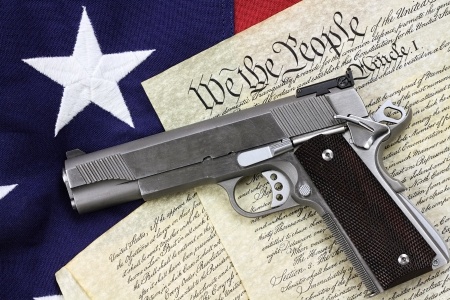The Sixth Circuit Court of Appeals decided Monday that individuals convicted of non-violent felonies can still be permanently prohibited from possessing a firearm if their overall criminal history includes violent conduct.
The unanimous decision by the court, based in Cincinnati, is the first to apply its newly established “dangerousness” standard for adjudicating challenges to the federal felony gun ban.
The case involved Jaylin Morton of Kentucky, who challenged his conviction for firearm possession as a felon under 18 U.S.C. § 922(g)(1).
In United States v. Morton, his attorneys argued that Morton’s conviction for non-violent felonies should not preclude him from possessing firearms. However, the panel determined that Morton’s total criminal record demonstrated sufficient “dangerousness” to justify the ban.
“Morton’s criminal record demonstrates dangerousness, specifically that he has committed ‘violent’ crimes ‘against the person,’” wrote Judge Rachel Bloomekatz, who authored the opinion. “So, his conviction is consistent with the Second Amendment as interpreted in Williams. Accordingly, § 922(g)(1) is constitutional as applied to him.”
Morton had been arrested for several outstanding warrants in 2022, and had a number of handguns in his possession. He had at least six felony convictions, including possession of a firearm as a felon, burglary, and intimidating a person. Among his priors, he shot at his ex-girlfriend and her family once and later showed up to her home and harassed her, while having a gun on his person. He also had a domestic violence conviction and other non-felony convictions.
Earlier this year, the Sixth Circuit established a framework for evaluating challenges to the federal felony gun ban that takes a look at the persons overall criminal history. The ruling leaves the courts with wide latitude to determine whether a person is simply too reckless and law-breaking to have a weapon.
The court’s interpretation aligns with the Supreme Court’s 2022 Bruen decision, which brought in historical context in Second Amendment cases but also left judges latitude in determining whether someone poses a threat to public safety.
More than 8,000 people are convicted for unlawful possession of a firearm under 18 U.S.C. § 922(g) every year. According to the United States Sentencing Commission, nine out of 10 of those cases involve gun possession by a felon, while firearm prosecutions are the third-most common federal offense.
Monday’s decision cements the Sixth Circuit’s stance that convicted felons with violent histories can be deemed a danger to society and thus barred from owning firearms.
The ruling has implications for Second Amendment litigation, as challenges to the federal felony gun ban have increased since the Bruen decision. By requiring an individualized assessment of “dangerousness,” the Sixth Circuit has given judges the power to make individualized determinations.
